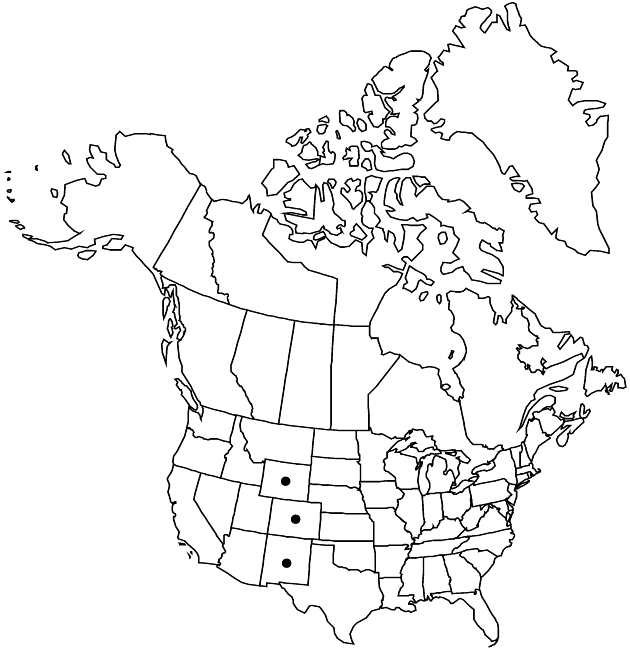Difference between revisions of "Packera fendleri"
Phytologia 49: 46. 1981.
FNA>Volume Importer |
FNA>Volume Importer |
||
| Line 15: | Line 15: | ||
|name=Senecio canovirens | |name=Senecio canovirens | ||
|authority=Rydberg | |authority=Rydberg | ||
| − | }}{{Treatment/ID/Synonym | + | }} {{Treatment/ID/Synonym |
|name=Senecio fendleri var. molestus | |name=Senecio fendleri var. molestus | ||
|authority=Greenman | |authority=Greenman | ||
| − | }}{{Treatment/ID/Synonym | + | }} {{Treatment/ID/Synonym |
|name=Senecio nelsonii | |name=Senecio nelsonii | ||
|authority=Rydberg | |authority=Rydberg | ||
| − | }}{{Treatment/ID/Synonym | + | }} {{Treatment/ID/Synonym |
|name=Senecio rosulatus | |name=Senecio rosulatus | ||
|authority=Rydberg | |authority=Rydberg | ||
| − | }}{{Treatment/ID/Synonym | + | }} {{Treatment/ID/Synonym |
|name=Senecio salicinus | |name=Senecio salicinus | ||
|authority=unknown | |authority=unknown | ||
| Line 42: | Line 42: | ||
|elevation=1600–3200 m | |elevation=1600–3200 m | ||
|distribution=Colo.;N.Mex.;Wyo. | |distribution=Colo.;N.Mex.;Wyo. | ||
| − | |discussion=<p>Packera fendleri is abundant, almost weedy in the southern Rocky Mountains. It thrives in a wide range of elevations and in a wide variety of habitats; flowering times vary. It frequently grows in close association with other species of Packera and may hybridize with them.</p> | + | |discussion=<p><i>Packera fendleri</i> is abundant, almost weedy in the southern Rocky Mountains. It thrives in a wide range of elevations and in a wide variety of habitats; flowering times vary. It frequently grows in close association with other species of <i>Packera</i> and may hybridize with them.</p> |
|tables= | |tables= | ||
|references= | |references= | ||
| Line 66: | Line 66: | ||
|publication year=1981 | |publication year=1981 | ||
|special status= | |special status= | ||
| − | |source xml=https://jpend@bitbucket.org/aafc-mbb/fna-data-curation.git/src/ | + | |source xml=https://jpend@bitbucket.org/aafc-mbb/fna-data-curation.git/src/8f726806613d60c220dc4493de13607dd3150896/coarse_grained_fna_xml/V19-20-21/V20_1307.xml |
|tribe=Asteraceae tribe Senecioneae | |tribe=Asteraceae tribe Senecioneae | ||
|genus=Packera | |genus=Packera | ||
Revision as of 15:19, 18 September 2019
Perennials, 10–40+ cm; rhizomatous (rhizomes horizontal to suberect, branched). Stems 1 or multiple (crowded to subcespitose), floccose-tomentose or glabrescent. Basal leaves petiolate; blades lanceolate to oblanceolate, 30–60+ × 10–30+ mm, bases tapering, margins shallowly, evenly pinnatifid to pinnatisect or wavy (adaxial faces floccose-tomentose or subglabrescent). Cauline leaves gradually reduced (sessile; lanceolate to oblanceolate, pinnatisect to wavy). Heads 6–25+ in open or compact, corymbiform arrays. Peduncles bracteate, densely to irregularly floccose. Calyculi 0 or inconspicuous (bractlets red-tinged). Phyllaries 13, green, 5–7 mm, floccose proximally to glabrescent distally. Ray florets 6–8+; corolla laminae 5–7 mm. Disc florets 30–40+; corolla tubes 2.5–3 mm, limbs, 2.5–3.5 mm. Cypselae 2.5–3 mm, glabrous; pappi 4–5 mm. 2n = 46.
Phenology: Flowering late May–early Oct.
Habitat: Steep slopes, loose, dry rocky or gravelly soils, along streams, open forests, disturbed sites
Elevation: 1600–3200 m
Distribution

Colo., N.Mex., Wyo.
Discussion
Packera fendleri is abundant, almost weedy in the southern Rocky Mountains. It thrives in a wide range of elevations and in a wide variety of habitats; flowering times vary. It frequently grows in close association with other species of Packera and may hybridize with them.
Selected References
None.